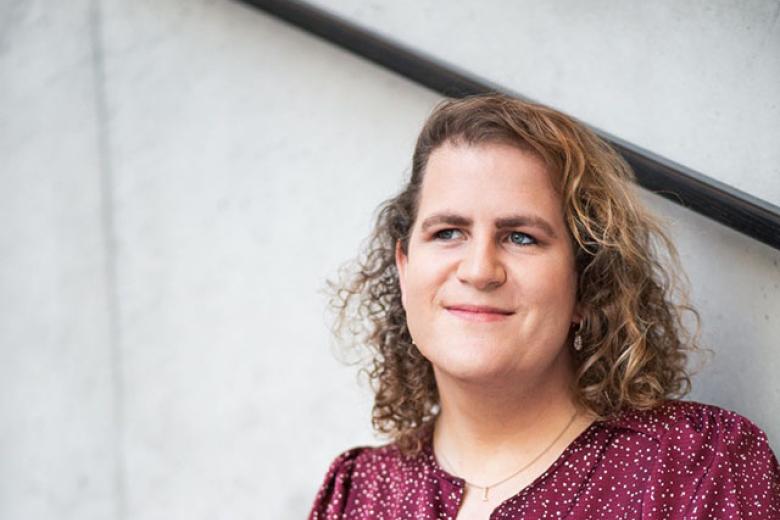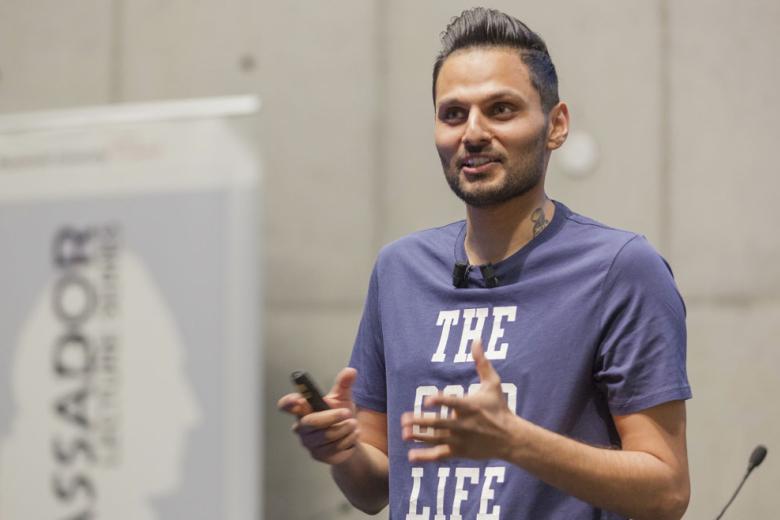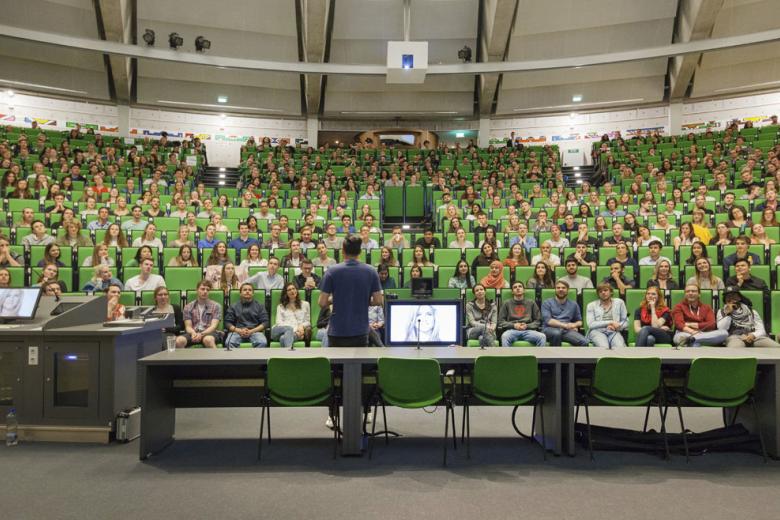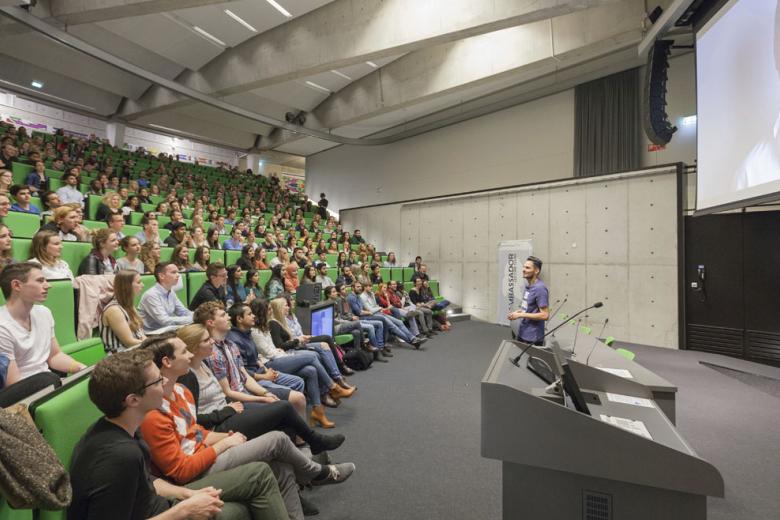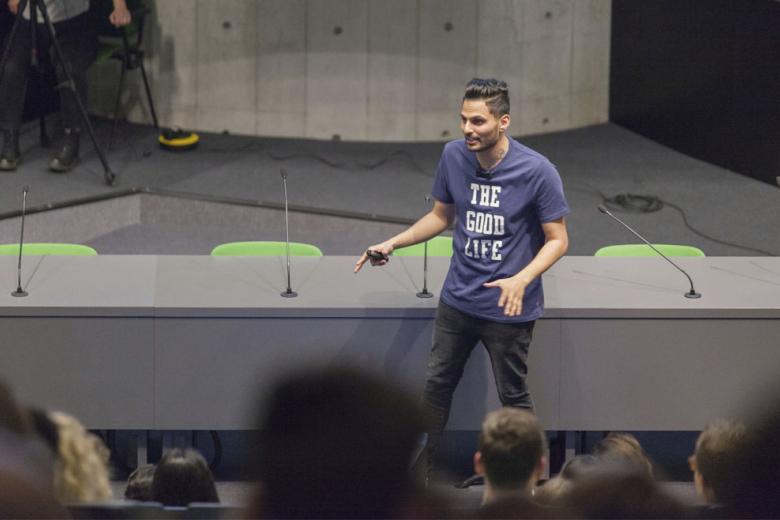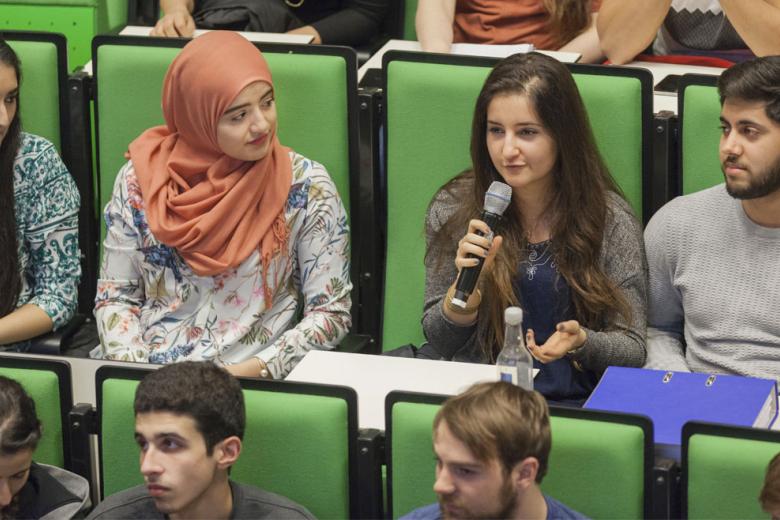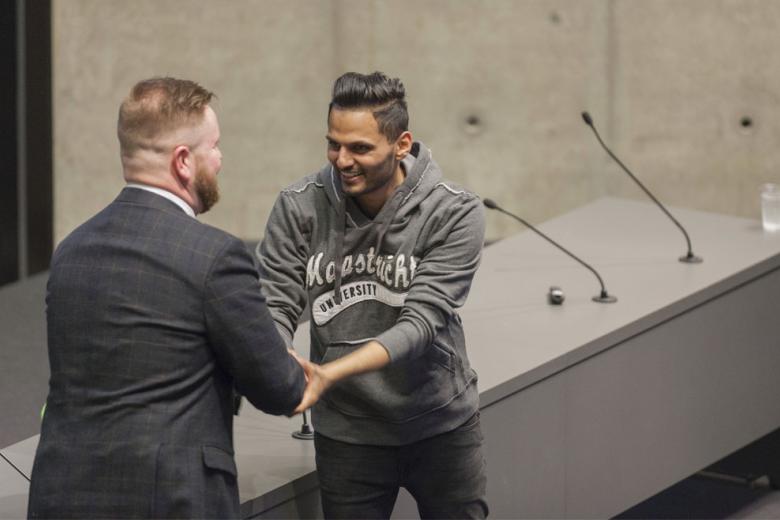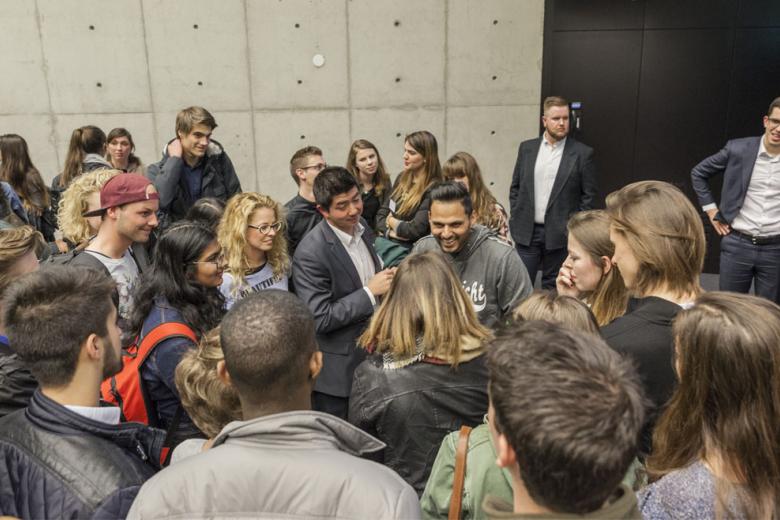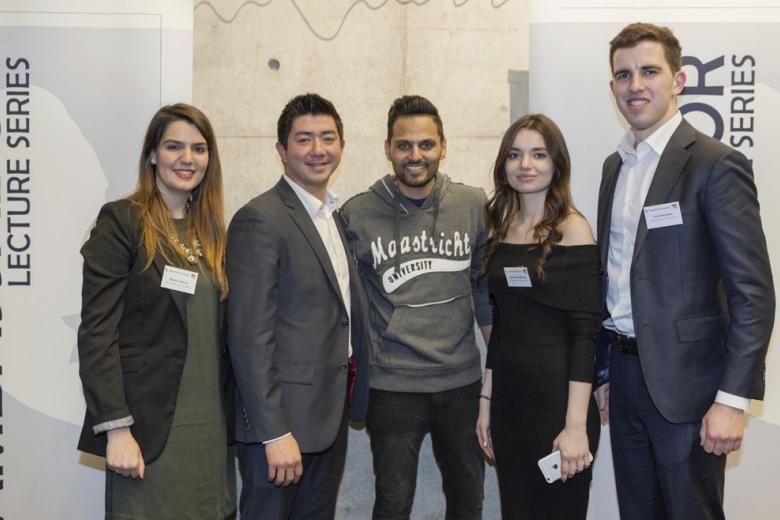The millennial guru
It’s Thursday 16 March and the Aula at Maastricht University’s School of Business and Economics is packed. Several hundred students have come to hear digital sensation Jay Shetty talk about the importance of “building a life, not a resume”. It was only in 2016 that the Londoner and former monk launched his Facebook channel, spreading his videos of wisdom. He soon went viral and has since attracted more than a million followers and a viewership of over 200 million. Before the lecture, which was part of the Ambassador Lecture Series, we spoke to Shetty about his life, finding a higher purpose and millennials.
He may be just 29, but he is already seen as a “millennial guru”. His motivational videos, in which he shares important life lessons, reach a wide audience; mainly millennials just like himself. Shetty has a clear mission: to share his knowledge of ancient wisdom with as many people as possible, and to help them 'find their passion and use it to serve others'. It's his first time in Maastricht.
Change makers
The success he's had over the past year has been enourmous. His audience seems to devour his talks on living a meaningful life. How does he explain the attraction? “Human behaviour hasn’t changed in comparison to previous generations: we’ve always wanted to be successful and happy. The difference is that technology is now rapidly amplifying and accelerating that behaviour”, Shetty says. He is referring to struggles millennials today are facing amid nonstop technological developments, being online 24/7, constant pressure to perform and endless possibilities. “Generations before us had no reason and meaning in life either; that’s why they worked at jobs they hated for forty years and watched TV when they got home. It’s just that now, millennials are looking back at their parents’ generation and starting to ask more questions, because they don’t want that life. This generation is no longer looking for financial security and a job for life, but rather for a deeper purpose and a better work–life balance. The questions they’re asking are good – it’s natural evolution.”
Shetty's advice for millennials is to not get too wrapped up in the world, to focus on intention and to use technology and information consciously. “I use technology all the time; I’m glued to social media. But I know why I’m there. If you know the reason you’re there, it becomes less stressful.” Through his videos, workshops and coaching sessions, he aims to build a community of change makers. “I want everyone to use the talents and skills they have for something beyond themselves. All of us have the potential to have great careers, make lots of money, live in beautiful houses, travel the world. But I just feel that without meaning, this will leave not only an empty feeling in a person’s life, but the world empty of their talent as well.”
The meaning of happiness
At the age of 18, Shetty came across the monk who introduced him to ancient wisdom. “He came to speak at my business school about the meaning of happiness and he blew me away like no one I’d heard before. Something connected; I could really relate to this philosophy of happiness not depending on external factors but being something within that we have to cultivate. I remember wondering: how has that guy given up everything I’m chasing – money, a fancy title, a fancy car – but still looks happy? I found something I wasn’t looking for and realised there was a gap in my life that I didn’t even know about.”
Immediately after the lecture he approached the monk – “I’m one of those people that if I like someone, I persevere so much that I will chase them down to get what I want” – and began spending time with him. The monk introduced him to meditation and ancient philosophies, but also showed him the work the monastery was doing in building sustainable villages and setting up food distribution programmes. “That’s where he really got me. Not only was this a very wise man, he was actually using his wisdom to help others, and I thought: that’s what I want to do for the rest of my life.” At 22, after graduating from business school, Shetty went to India and lived as a monk for three years.
Long and winding road
Like many others, Shetty has come a long way to find his passion. “Before I became a monk, I had a pretty decent life and was doing well for myself. But it took me a long time to get where I am today, because your purpose is sometimes pushed on you by other people, by your parents, by society. I fell in love with art growing up and wanted to go into art direction or graphic design, and use my work to convey a message. But when the time came to look at universities, the parent in me kicked in and said: ‘that’s not going to make any money’, so I ended up going to business school.” He hasn’t exactly always loved public speaking and being in the spotlight. “I grew up being an introvert and was really shy. My mum would always force me on stage, but I'd run off and even struggled with interaction. So my parents forced me to go to drama and public-speaking classes, because they felt it would be a useful skill. Little did we know it would become what my life is based on today”, he laughs.
Wind machine
He is grateful for his success, but doesn´t feel overwhelmed by it. “It´s nice to be loved by people; why would you not want that? I would be inhuman if I said the success didn’t affect me. But you’ve got to be wary, because it’s very easy to become egotistical and get lost in your own hype.” He has his critics, too, who see his videos as one long reel of unoriginal clichés. He’s not too bothered by this. “Haters gonna hate. What I take away is that people are cynical and that’s OK. You’ll never be able to avoid criticism. I pay attention to those who love me, and thankfully, that proportion is higher. In the end, people are entitled to their own opinion. I often get this comment that I have a wind machine in my videos. Which I don’t, but my hair is flying around, because it was really windy that day. I find that hilarious and think maybe next time I should actually use one, otherwise I might lose the effect”, he jokes.
Shetty’s lecture is received, on the whole, with great enthusiasm. Someone in the audience can be heard saying she followed Shetty’s advice on Facebook a year ago and has since given her first international Ted Talk. Students flock to the front of the hall to shake his hand or ask a question. But one millennial still has her doubts: it’s nice to talk about living a fulfilling life, and sure, you can follow all kinds of courses, but if you have no idea where your heart lies and what you’re good at, finding your passion and purpose is no easy task.
By Dunja Bajic
Gallery
Also read
-
Maastricht Business Days 2024: Building bridges between talent and opportunity.
The Maastricht Business Days (MBD) have been a hallmark of the School of Business and Economics (SBE) since their inception in 1996, standing out as the most prestigious student recruitment event. Organized by SCOPE, the faculty’s dynamic study association, the MBDs connect over 600 students...
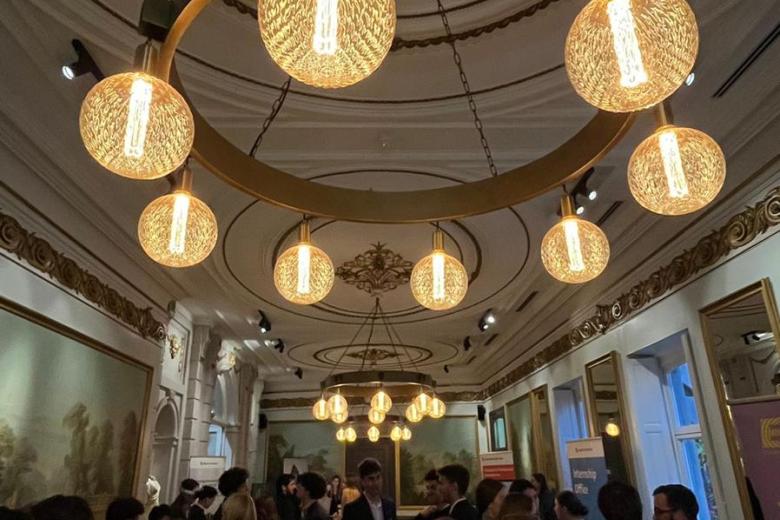
-
Empowering Smallholder Farmers in the Data Economy: Unlocking Opportunities and Overcoming Obstacles
Frederik Claasen, the head of policy at our partner organisation Solidaridad Network on the opportunities and obstacles facing smallholder farmers in their data ecosystems.
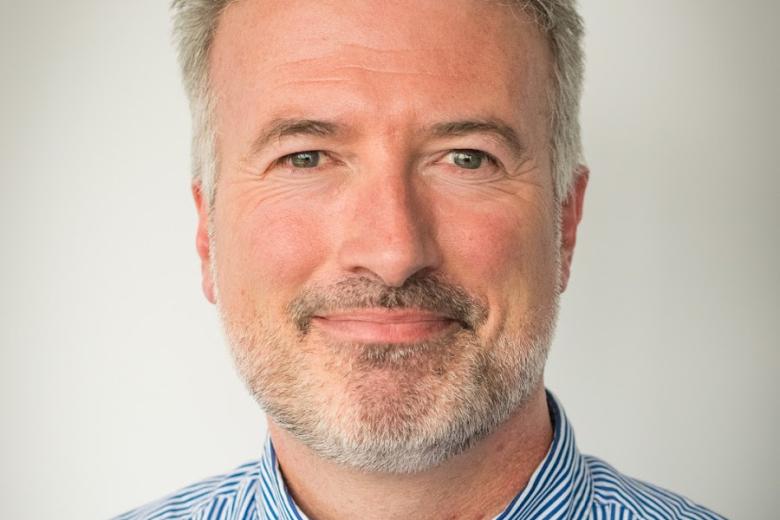
-
Soft landing in Vienna
After several rocky years, Maastricht University alum Lea Vink has found her feet in Vienna. Professionally, she is taking new steps at the crossroads of aviation and organisational psychology. And on a personal level, luck has smiled on her since her transition from man to woman.
